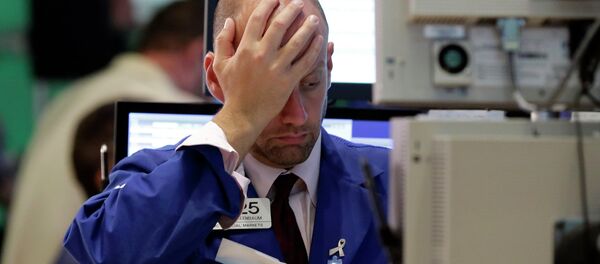Kristian Rouz — Wall Street is trading in the red on Thursday's morning, retreating for the fourth consecutive session after a bag of mixed macro data in employment, homebuilding, US crude price and overall economic activity suggested a weaker expansion of the real economy. The US Federal Reserve emphasized an alarming situation in emerging markets and global growth, suggesting little decisiveness to raise interest rate in September. Meanwhile, minutes from July's meeting of the Federal Open Market Committee (FOMC) released yesterday suggested US policymakers are not very close yet to making a hike decision.
Today's decline in US stocks is chiefly a consequence of the selloff in global stocks, battered by a collapse in many emerging financial markets. The S&P 500 Index dropped to its lowest in 12-months amidst investors' anxiety, while the market sentiment in the probability of a September Fed hike dropped to 36% from 46% a week prior.
The Dow Jones Industrial Average Index declined by 1.17% to 17,146.59 points by 11:29 AM in New York, the S&P 500 shed 1.21% to 2,054.50 at 11:14 AM, while the more dynamic tech-driven Nasdaq Composite Index slumped 1.77% to 4,930.00 points at 11:14 AM.
The US Fed cited weak inflation in its minutes of the July FOMC meeting, released yesterday. Even though the regulator emphasized an ever-improving labor market, investors and traders reacted with an increased number of selling bets, effectively dropping the average equity price below its 200-day average.
In US macro data, the bright spots are the housing and labor markets. Existing homes sales jumped to their 8-year high as an effect of the looming Fed hike: consumers are rushing into mortgages while the interest is still low. The National Association of Realtors reported on Thursday that existing house sales rose 2% in July to an annual rate of 5.59 mln units, which is slightly above previous forecasts and 10.3% above the July 2014 level.
In employment, although initial jobless claims added 4,000 to 277,000 in mid-August, seasonally-adjusted, payrolls also rose by 215,000, which is above last the seven-months average of 200,000. Nationwide unemployment is between 5.0% and 5.2%, close to the Fed's 'full employment' target. However, the ‘real' unemployment is allegedly reaching 20% in some parts of the US for certain age groups, but these numbers are not confirmed by the official numbers and other macro indicators. The number of people receiving benefits dropped by 24,000 to 2.25 mln in early August, as opposed to allegations of some 50 mln Americans living off the national subsidies.
Among more pessimistic factors, a measure of US future economic activity dropped in July to 0.2% from June's reading of 0.6% to a steep drop in homebuilding permits. The measure suggests mediocre expansion throughout the rest of this year.
US crude price slumped to nearly $40/bbl, reaching its lowest point since the financial crisis of 2009, while the general trend for oil is downward. US crude stockpiles dramatically rose last week by 456.21 mln bbl to 2.6 mln bbl, while Canada increased exports to the US, and demand for oil is low elsewhere. Mideast shipments also rose, resulting in a significant oversupply of oil.





